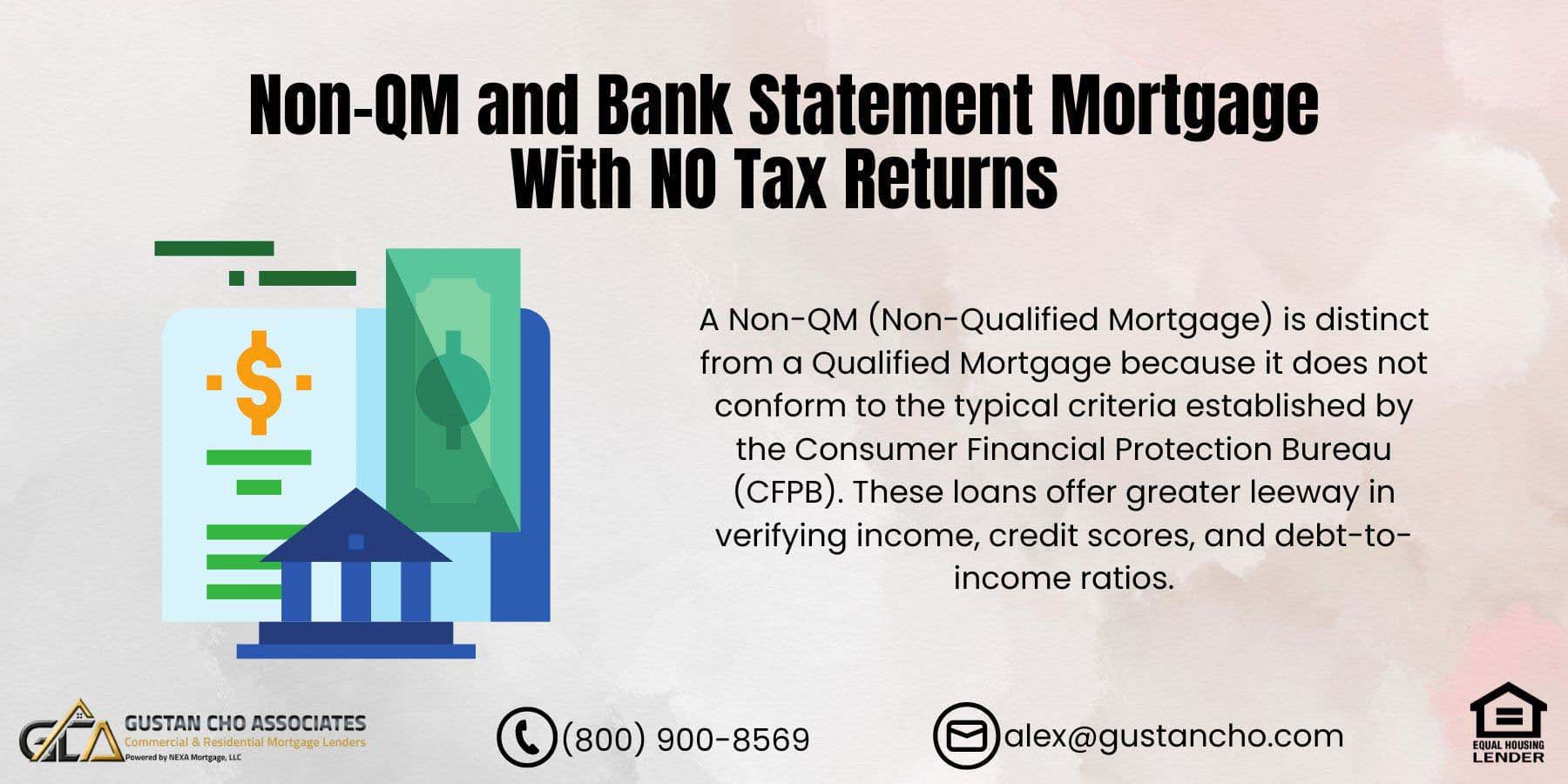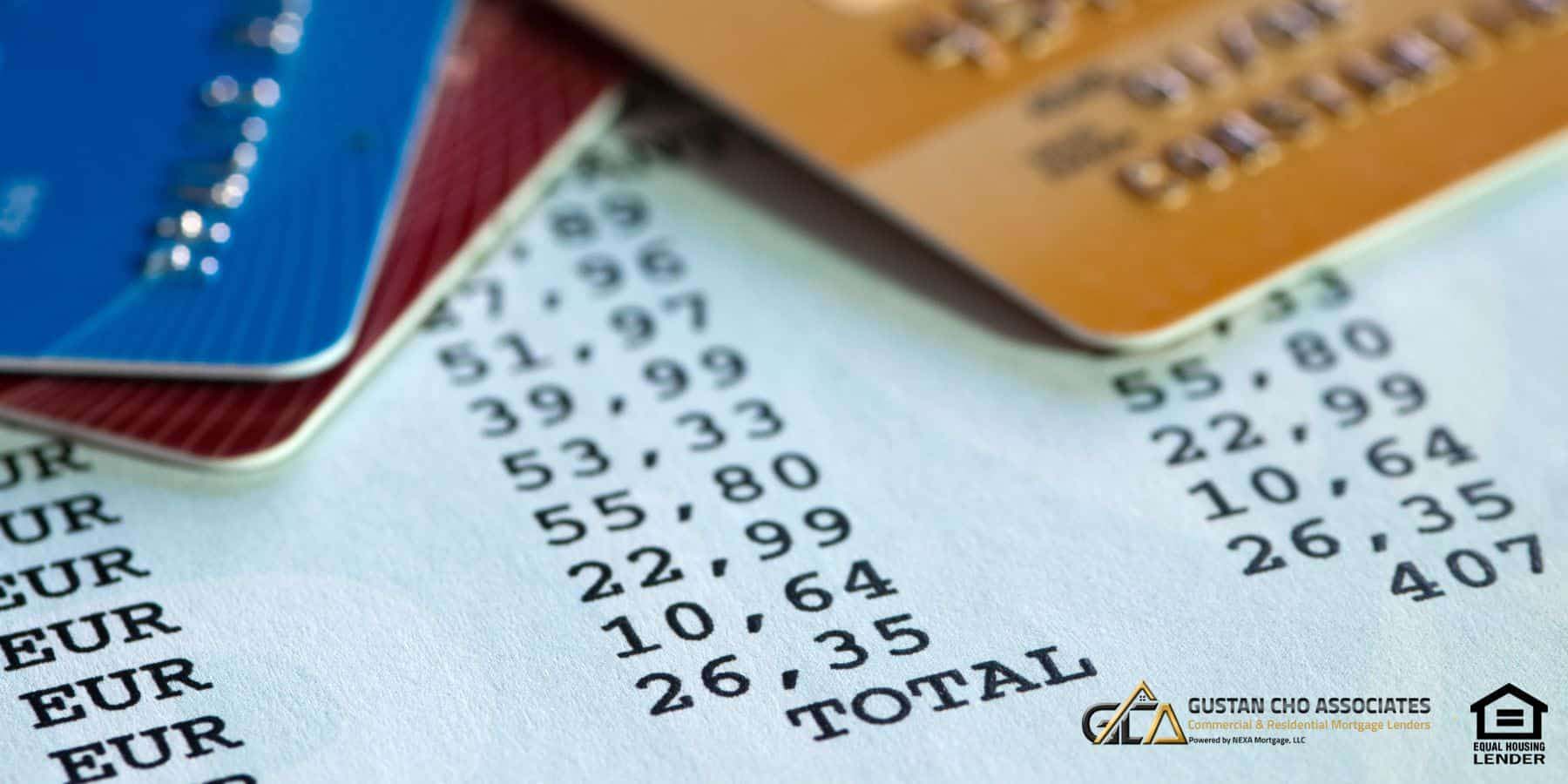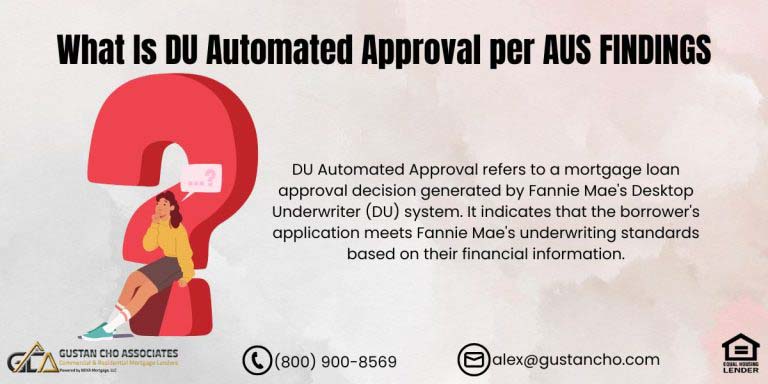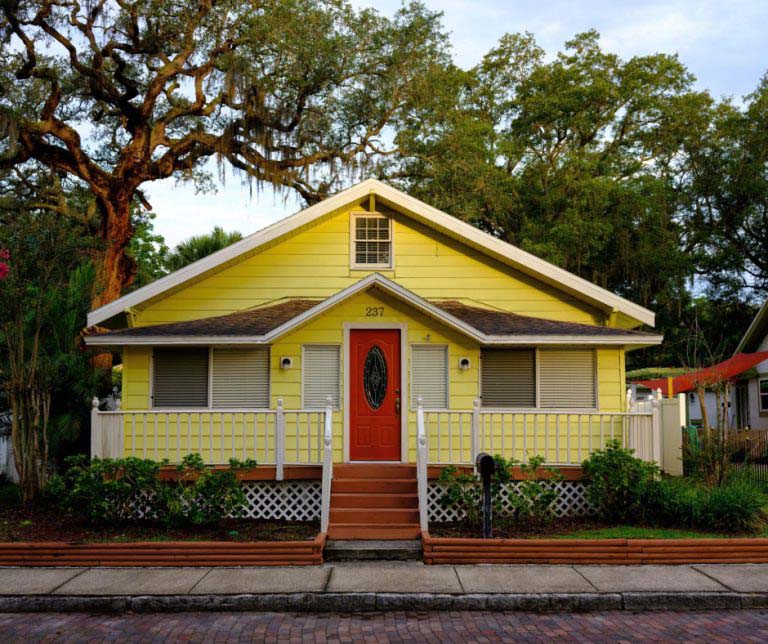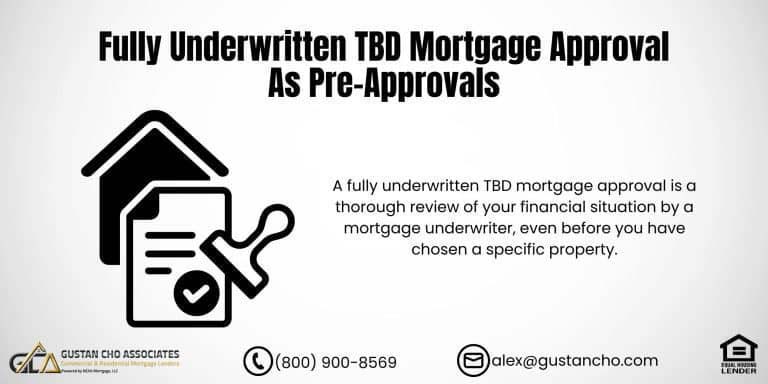In this article, we will cover and discuss non-QM and bank statement mortgage with no income verification. Non-QM and bank statement mortgage loans do not require income verification. Therefore, income tax returns are not required on non-QM and bank statement mortgage loans.
Gustan Cho Associates offer a wide variety of mortgage products. Over the past few years, we have seen the comeback in NON-QM and Bank Statement mortgage lending.
QM stands for a qualified mortgage. In the following paragraphs, we will cover non-QM and bank statement mortgage loans with no income verification and no income tax returns. Please read our blog detailing what a QM MORTGAGE is for more information. Non-QM and bank statement mortgage loans are designed for borrowers who might need to meet the traditional requirements for a Qualified Mortgage.
What Are Non-Qualified Mortgages?
NON-QM means non-qualified mortgage, where Fannie Mae, Freddie Mac, VA, and FHA guidelines are not required. Of course, each NON-QM and Bank Statement Mortgage loan product has different qualifications. These mortgage products open up opportunities for thousands of Americans to buy a home or refinance their home.
Non-QM loans are particularly useful for self-employed individuals or those with irregular income who may need standard documentation such as tax returns.
In the following paragraphs, we will cover how non-QM and bank statement mortgage loans work and their key features. Gustan Cho Associates has a national reputation for being able to handle home loans other lenders cannot. Gustan Cho Associates is a mortgage company licensed in multiple states with no lender overlays on government and conventional loans.
Self-Employed or Have No Tax Returns? Qualify for a Non-QM or Bank Statement Mortgage!
Contact us today to explore Non-QM and bank statement mortgage options and get pre-approved without the need for tax documents.
What Are Non-QM Loans
Non-QM Loans: Non-qualified mortgages do not meet the Consumer Financial Protection Bureau’s (CFPB) standard guidelines for Qualified Mortgages. They offer more flexibility regarding income verification, credit scores, and debt-to-income ratios. This is ideal for self-employed individuals, investors, or those with irregular income who cannot provide traditional proof of income such as W-2s or tax returns.
Key Features of non-QM and Bank Statement Mortgage Loans
Non-QM lenders use alternative methods to verify income, such as bank statements, asset utilization, or profit and loss statements. While non-QM loans may have more lenient credit score requirements, borrowers must demonstrate a strong overall financial profile. Non-QM loans may require a larger down payment than traditional mortgages, often around 20-30%.
How Do Non-QM and Bank Statement Mortgage Loans Work
Bank Statement Mortgages: These loans allow borrowers to qualify based on the income shown in their bank statements rather than traditional income documentation like tax returns. This especially benefits self-employed individuals with significant deductions that reduce their taxable income.
Lenders typically require 12 to 24 months of personal or business bank statements to determine average monthly income. Borrowers do not need to provide tax returns, simplifying the application process for those with complex financial situations.
Interest rates may be higher than traditional loans, reflecting the increased risk to the lender. However, competitive rates are available depending on the borrower’s credit profile and overall financial situation. While non-QM and bank statement mortgages can accommodate lower credit scores, a higher score will improve your chances of approval and securing favorable terms.
How is Income Calculated on Non-QM and Bank Statement Mortgage Loans
Provide 12 to 24 months of bank statements to demonstrate consistent income. Be prepared to make a substantial down payment, typically 20% or more. Lenders will assess your debt-to-income ratio, but they might be more flexible than traditional mortgages. Gustan Cho Associates are mortgage bankers, correspondent lenders, and mortgage brokers due to their ability to broker non-QM and alternative loan programs.
Non-QM and Bank Statement Mortgage Application Process
Select a lender specializing in non-QM and bank statement mortgages. Examples include Angel Oak Mortgage Solutions, Carrington Mortgage Services, and First National Bank of America. Provide the necessary bank statements and documents per the lender’s criteria. Work with the lender through the underwriting process to secure loan approval.
Benefits and of Non-QM and Bank Statement Mortgage Loans
Easier qualification process for those with non-traditional income sources. Eliminates the need for tax returns, simplifying the documentation process. Interest rates may be higher than traditional loans. This may require a higher down payment. By considering non-QM and bank statement mortgages, you can find suitable financing options that align with your financial situation and goals, especially if traditional mortgage routes are not feasible.
Are Bank Statement Mortgages Non-QM Loans?
A bank statement loan simply uses your business or personal bank statements to calculate income. Income tax returns are not required on bank statement loans for self-employed borrowers.
Bank statement loans are for self-employed borrowers and not W2 wage earners. Normally, the average of 12 months of bank statement deposit averages is used for qualified income. Withdrawals do not matter.
Unlike a traditional mortgage, W-2s, pay stubs, and tax returns are not required. Only your business income shown on your bank statements will count as income for this mortgage product. This is a great tool to use for self-employed borrowers. Depending on your business write-offs and advice from your tax professional, will determine which option is best for you.
No Tax Returns? No Problem! We Offer Non-QM and Bank Statement Mortgages!
Reach out now to learn about Non-QM and bank statement mortgage options that fit your needs.
Can You Qualify For a Mortgage If You Are Self-Employed?
Many times, self-employed borrowers utilize write-offs on their Federal tax returns filed with the Internal Revenue Service (IRS). While many lending institutions advertise that they offer Non-QM and bank statement mortgage loans, it is important to select a loan officer who is familiar with these loan products. Gustan Cho Associates fund NON-QM and bank statement mortgage loans every month. We are experts in the bank statement loan guidelines and know how to get these loans to the finish line as fast as possible.
What Are The Different Types of Non-QM Mortgage Loan Options?
We have numerous outlets for our Non-QM and bank statement mortgage loans. Each with slightly different qualifications. Credit scores may go down all the way to 580 and still utilize a bank statement loan. Just like any other mortgage, the credit score does have an impact on the interest rate.
Since we complete so many bank statement loans, we have an underwriting team who will calculate your bank statement, and income upfront before you are issued a pre-approval.
Higher the credit score, lower the interest rate. All of our bank statement mortgage options require a minimum of 10% down payment. This way, the amount of income underwriting will use for the loan will not change during the mortgage process. This will allow you to confidently shop for a home within your price range and budget.
Does Credit Scores Determine Down Payment on Home Purchase?
The borrower’s credit scores will determine the down payment requirement on non-QM and bank statement mortgage loans. The higher the borrowers’ credit scores, the less the down payment is required. Below is a general overview of the credit score versus the down payment requirement on non-QM and bank statement mortgage loans.
- Credit scores 580-599 will require at least a 20% down payment
- Credit scores 600- 659 require at least a 15% down payment
- Credit scores 660 and above only require a 10% down payment
The higher the borrower’s credit scores, the less the risk for the lender. The less the mortgage lender has the lower the down payment requirement. However, every lender have there own non-QM and bank statement mortgage guidelines on credit score versus down payment.
How Do Mortgage Lenders Underwrite Non-QM Loans
For example when a bank statement loan is used. In this example, we will utilize a borrower’s name, Mark. Mark is a self-employed borrower who runs a landscaping business. When Mark files his IRS tax returns, he utilizes almost every right off he can. So, in the eyes of the IRS, he does not make much income. The debt-to-income ratios will not allow Mark to qualify for a conventional or FHA mortgage. Mark is looking to purchase a home because he is tired of renting.
Mark shows plenty of business-related deposits on his bank statements over the past 12 months. Mark uses a separate bank account for business and personal items. Mark has a credit score of 643. In this example, Mark will need a 15% down payment.
This is not a problem. Mark will sit down with his CPA and decide if paying a higher interest rate on the mortgage is saving him more money versus claiming more income to the IRS. If Marc chooses, he can file his next two years of tax returns showing higher income. While this may result in paying more income tax, he will soon be able to refinance into your standard conventional or FHA mortgage and have a lower interest rate. It is important to work closely with your tax professional to see where this breakeven points land.
Terms Of Non-QM and Bank Statement Mortgage Loans
The majority of Non-QM and bank statement mortgage loans are structured on a 5/1 or 7/1 adjustable-rate mortgage (ARM). This gives you a full five or seven years to complete a refinance before the rate starts to adjust. Many clients utilize this time frame to file stronger tax returns to refinance into a lower rate. You may also increase the rate slightly to turn the bank statement loan into a 30-year fixed mortgage.
Non-Prime and Alternative Financing Programs
There are many reasons clients use NON-QM mortgages besides bank statement loans. We offer a full slate of investment property mortgages, foreign national products, asset depletion mortgages, and debt consolidation NON-QM loans. There is even a 5% down payment Jumbo Mortgage option.
NON-QM mortgage options: The investor cash flow mortgages require the rents received on an investment property to cover the NON-QM mortgage payment.
You can also put down as little as 20% to receive to enter my needs mortgages. Foreign national programs are set up for investors who do not live in the United States but would like to invest in real estate here. Even without a United States credit report, they are still eligible for mortgage financing.
Asset Depletion Mortgage Loan Programs
Asset depletion is something that is really picked up over the past few years. This allows a borrower to utilize liquid assets as income to qualify for a mortgage. Depending on the rate at which these assets will deplete, will determine how much income can be used for the assets. FREDDIE MAC has a similar program.
Need a Mortgage but Have No Tax Returns? Non-QM and Bank Statement Loans Can Help!
Contact us today to discuss how Non-QM and bank statement loans can help you secure financing.
Debt Consolidation Non-QM Mortgages
NON-QM Has amazing debt consolidation loans available. Depending on your credit score, you may go as high as 90% loan-to-value. Fall conventional Cash Out mortgages are capped at 80% LTV. FHA mortgages are capped at 85% LTV. NON-QM can go all the way to 90% LTV. This is only true if you are consolidating debt. A client may not receive any cash in hand with a debt consolidation NON-QM loan.
90% LTV Non-QM Jumbo Mortgages
90% JUMBO MORTGAGE: You may now use a NON-QM Jumbo loan with just a 10% down payment. This is an amazing option for clients with at least a 660 credit score higher. The maximum debt-to-income ratio is capped at 50%. Please see our 90% JUMBO MORTGAGE BLOG for more information.
For more information on our bank statement mortgages or our other NON-QM and Bank Statement Mortgage loan options, please reach out to Mike Gracz on (800) 900-8569 or text us for a faster response. Or email us at gcho@gustancho.com.
Mike is the expert on our NON-QM products. Either Mike or one of the highly-skilled loan officers at Gustan Cho Associates will assist you with your NON-QM and Bank Statement Mortgage pre-approval. The team at Gustan Cho Associates is available seven days a week to assist you with your mortgage needs. NON-QM and Bank Statement Mortgage options Open the pathway to homeownership for thousands of Americans who do not fit in the highly regulated mortgage guideline round. Please reach out today for more information.
FAQs: Non-QM and Bank Statement Mortgage With NO Tax Returns
- 1. What is a Non-QM Mortgage? A Non-QM (Non-Qualified Mortgage) is distinct from a Qualified Mortgage because it does not conform to the typical criteria established by the Consumer Financial Protection Bureau (CFPB). These loans offer greater leeway in verifying income, credit scores, and debt-to-income ratios.
- 2. Who can benefit from non-QM loans? Non-QM loans are ideal for self-employed individuals, investors, or those with irregular income who cannot provide traditional proof of income, such as W-2s or tax returns.
- 3. How do Non-QM and Bank Statement Mortgage Loans work? Borrowers may be eligible for these loans using the income shown in their bank statements instead of the usual income verification documents like tax returns. Generally, lenders require 12 to 24 months of personal or business bank statements to determine average monthly income.
- 4. What are the key features of Non-QM and Bank Statement Mortgage Loans? Non-QM and Bank Statement Mortgage Loans are characterized by their alternative income verification methods, including bank statements, asset utilization, or profit and loss statements. These loans have easier credit score requirements, but you’ll need a strong financial profile. You’ll also need to make a higher down payment, usually between 20% and 30%. The interest rates could be higher because the lender is taking on more risk.
- 5. How is income calculated for these loans? Lenders assess income based on the average deposits shown in 12 to 24 months of bank statements, ignoring withdrawals.
- 6. What is the Non-QM and Bank Statement Mortgage Loans application process? To apply for non-QM and Bank Statement Mortgage Loans, you must begin by selecting a specialized lender. Some examples of these lenders are Angel Oak Mortgage Solutions, Carrington Mortgage Services, and First National Bank of America. Then, you must provide the necessary documentation, including bank statements and any other required documents. Finally, you will need to undergo the underwriting process, working closely with your chosen lender to secure approval for the loan.
- 7. What are the benefits of non-QM and Bank Statement Mortgage Loans? Non-QM and Bank Statement Mortgage Loans offer several advantages, including simplified qualification processes that are more accessible for individuals with non-traditional income sources. They do not require tax returns, streamlining the documentation process. Additionally, they feature flexible terms that can support lower credit scores and offer a range of loan structures.
- 8. Are bank statement mortgages considered non-QM loans? Yes, bank statement loans are a type of non-QM loan designed specifically for self-employed borrowers who want to use their bank statements to calculate income instead of traditional income documentation.
- 9. Can you qualify for a mortgage if you are self-employed? Self-employed individuals can be eligible for Non-QM and bank statement mortgage loans by showing steady income through bank statements. Collaborating with an experienced loan officer who is well-versed in these types of loans is crucial.
- 10. What types of non-QM mortgage loan options are available? Several non-QM mortgage loan options are available. These options include Bank Statement Loans, based on income shown in bank statements, and Investment Property Mortgages, designed for individuals whose rental income covers mortgage payments. Foreign National Products caters to non-U.S. residents looking to invest in U.S. real estate. Asset Depletion Mortgages allow the use of liquid assets as proof of income. Debt Consolidation Loans are available, allowing higher loan-to-value ratios for consolidating debt. Additionally, Jumbo Loans are a Non-QM option that requires as little as a 10% down payment.
- 11. How do credit scores affect down payments on non-QM loans? The relationship between credit scores and down payments on Non-QM loans operates on a sliding scale where a higher credit score results in a lower down payment requirement. For credit scores ranging from 580 to 599, a minimum of 20% down payment is necessary. If the credit score falls between 600 and 659, the down payment needed decreases to at least 15%. For credit scores of 660 and above, the required down payment is further reduced to at least 10%.
- 12. How do mortgage lenders underwrite non-QM loans? Lenders evaluate financial profiles, including credit scores, debt-to-income ratios, and income verification, through bank statements or other alternative documentation methods.
- 13. What are the terms of Non-QM and Bank Statement Mortgage Loans? Typically structured as 5/1 or 7/1 adjustable-rate mortgages (ARMs) with options to refinance into a lower rate within five to seven years. Fixed-rate options are also available.
- 14. What are some examples of non-QM mortgage programs? Some examples of non-QM mortgage programs include Investor Cash Flow Mortgages based on rental income and Foreign National Programs designed for non-residents investing in U.S. real estate. Asset Depletion Mortgages consider assets as a form of income. Debt Consolidation Loans offer higher loan-to-value ratios for consolidating debts. Additionally, 90% of LTV Jumbo Mortgages are non-QM Jumbo loans that require only a 10% down payment.
- 15. How can you get more information or apply for a Non-QM or Bank Statement Mortgage Loan? Contact Gustan Cho Associates at 800-900-8569, send a text for a faster response, or email gcho@gustancho.com. Their team of knowledgeable loan officers is ready to assist with the pre-approval and application process.
No Tax Returns? Get the Mortgage You Need with Non-QM or Bank Statement Loans!
Contact us today to learn how you can qualify without tax returns.


